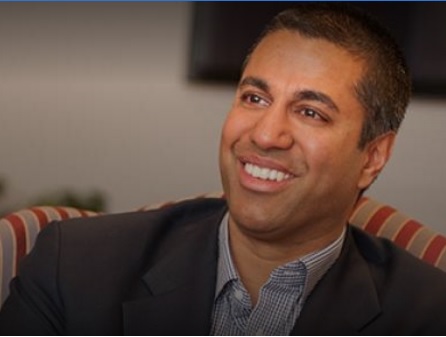Pai Explains Lifeline Moves
The smarter way to stay on top of the multichannel video marketplace. Sign up below.
You are now subscribed
Your newsletter sign-up was successful

Federal Communications Commission chairman Ajit Pai posted his first official FCC blog item addressing what he said had been sensationalized and misleading reporting about the FCC's move to rescind nine Lifeline subsidy authorizations. He did not point fingers at any story in particular. (The New York Times on Sunday published an article about Pai's early moves, noting that "[h]e stopped nine companies from providing discounted high-speed internet service to low-income individuals.")
"[B]ased on the some of the coverage, one would think that we had ended Lifeline broadband subsidies altogether," he wrote. "So I want to set the record straight about the modest steps we have taken and why we have taken them....Hyperbolic headlines always attract more attention than mundane truths."
The chairman wanted to point out -- and did -- that the move only affected 9 of the 900 companies participating in the Lifeline program, which is meant to provide essential communications services to low-income residents. "In other words, 99% of the companies participating in the program are not affected at all," he said.
He also wanted to clarify that only of the nine had any customers yet. Pai pointed out that those nine had not been rejected outright, but were still "pending."
The decision to rescind them was among a number of Pai FCC moves affecting decisions under then-chairman Tom Wheeler that came after the election, and Pai made clear that was also a factor.
"Many of these designations were approved in the last days of the last Administration (two days before Inauguration Day), over the objections of two of the four Commissioners, despite the fact that the FCC’s congressional oversight committees had requested that the Commission not take controversial actions during the transition between Administrations (consistent with the request from those same committees during the Republican-to-Democrat transition in 2008–09)," Pai said in the post. "Thus, a majority of Commissioners never supported approval of these designations."
On Friday (Feb. 3), Pai's acting bureau chief revoked the eligibility and accompanying streamlined treatment, citing a National Tribal Telecommunications Association petition to reverse the eligibility on some of the companies, and because it would "promote program integrity by providing the Bureau with additional time to consider measures that might be necessary to prevent further waste, fraud, and abuse in the Lifeline program."
The smarter way to stay on top of the multichannel video marketplace. Sign up below.
Pai complained that the FCC under his predecessor had failed to sufficiently root out such abuse.
Citing "shortcomings in the Bureau’s prior orders" and "procedural failings" including allegedly not informing tribal governments that they were seeking eligibility from the FCC, acting bureau chief Kris Montieth said the bureau "cannot conclude at this time that LBP designations are in the public interest for any of the entities..."
That drew a lot of pushback from Lifeline advocates, including from the Hill, the Communications Workers of America and the American Library Association.
But Pai made clear in his blog that the process needed vetting before more companies were allowed to participate in the program.
"[E]very dollar that is spent on subsidizing somebody who doesn’t need the help by definition does not go to someone who does," he said. "That means that the Commission needs to make sure that there are strong safeguards against waste, fraud, and abuse before expanding the program to new providers."
Contributing editor John Eggerton has been an editor and/or writer on media regulation, legislation and policy for over four decades, including covering the FCC, FTC, Congress, the major media trade associations, and the federal courts. In addition to Multichannel News and Broadcasting + Cable, his work has appeared in Radio World, TV Technology, TV Fax, This Week in Consumer Electronics, Variety and the Encyclopedia Britannica.

